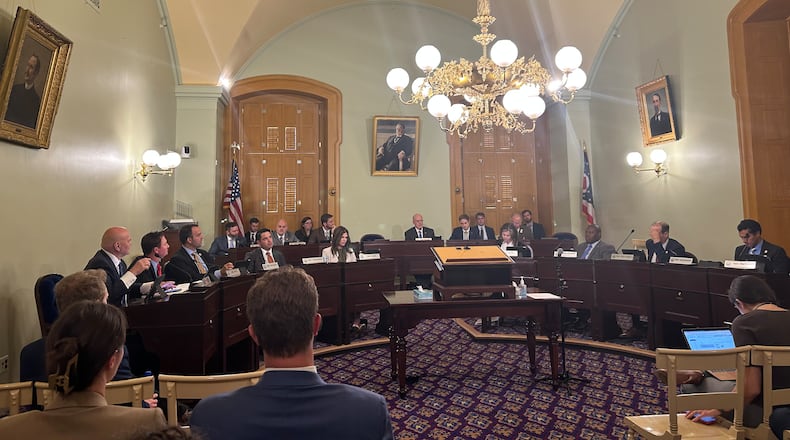Rep. Thomas Hall (R-Madison Twp.) introduced his bill at the end of May. It has had five hearings in the House Ways and Means Committee. Hall introduced amendments last week to include agricultural properties and a three-year sunset clause that gives the legislature time to implement comprehensive tax reform.
On Tuesday, another amendment was approved — by a vote of 10 to 5 — that gives more control to county auditors when they and the state commissioner can’t agree on value increases. Vice Chair Brian Lorenz (R-Powell) introduced the amendment.
“This amendment flips the script so to speak on the sexennial reappraisal and triennial update process,” he said, explaining that under current law the tax commissioner’s values are given deference and county auditors must appeal to the Board of Tax Appeals to fight for their reappraisal amounts. The amendment says the tax commissioner would have to take to the BTA and prove their numbers are more valid.
Former Butler County Auditor Roger Reynolds is the only auditor to have ever challenged the tax commissioner’s numbers. He fought and lost his attempt to change an average 20% value hike after the 2020 reevaluation.
The County Auditors Association of Ohio has opposed the bill up until now, but Warren County Auditor Matt Nolan, who speaks for the group, told the Dayton Daily News this provision makes it more “palatable.”
“The idea behind it and this is something the auditors suggested to the legislature, is right now the burden is on the auditor to prove the tax commissioner has it wrong, that’s what Roger tried to do and failed and all of that that resulted,” Nolan said. “What this tries to do is say the reverse, that the auditor’s value is presumed to be correct unless the tax commissioner can prove that it’s wrong.”
Gary Gudmundson, press secretary for Ohio Tax Commissioner Patricia Harris, told the Dayton Daily News “We are reviewing the amendment that was included in HB 187 yesterday in committee and how it will affect the valuation process across the state.”
Hall told the Dayton Daily News he is encouraged a couple Democratic committee members voted to move the bill forward. The bill was sent to the House Rules and Refence Committee so it can get scheduled for a vote by the entire House.
There isn’t an official House session scheduled until Oct. 18, but the calendar calls for sessions on Sept. 27 and Oct. 11 “if needed.” Hall said he doesn’t believe enough representatives will be in Columbus for a session next week.
“We’re supposed to have caucus next week to get a better understanding of when people are in town, I’m hoping that is sooner rather than later, but it’s looking like it’s going to be still two to three weeks depending on if we can get enough members in town to have a vote,” Hall said. “It’s important because if we want to try for an emergency clause we’ve got to have 60.”
In order for the measure to impact tax bills that come out early next year, the legislature would need to pass it — in both chambers —as an emergency clause so it could take effect immediately rather than the typical three-month lag time. It would take 60 of 99 representatives to vote for the clause, if only 60 show up, “then we’d be in trouble,” Hall said.
Sen. George Lang (R-West Chester Twp.) introduced a tandem bill last week and it was scheduled for a hearing in the Senate Ways and Means Committee late Wednesday.
About the Author

